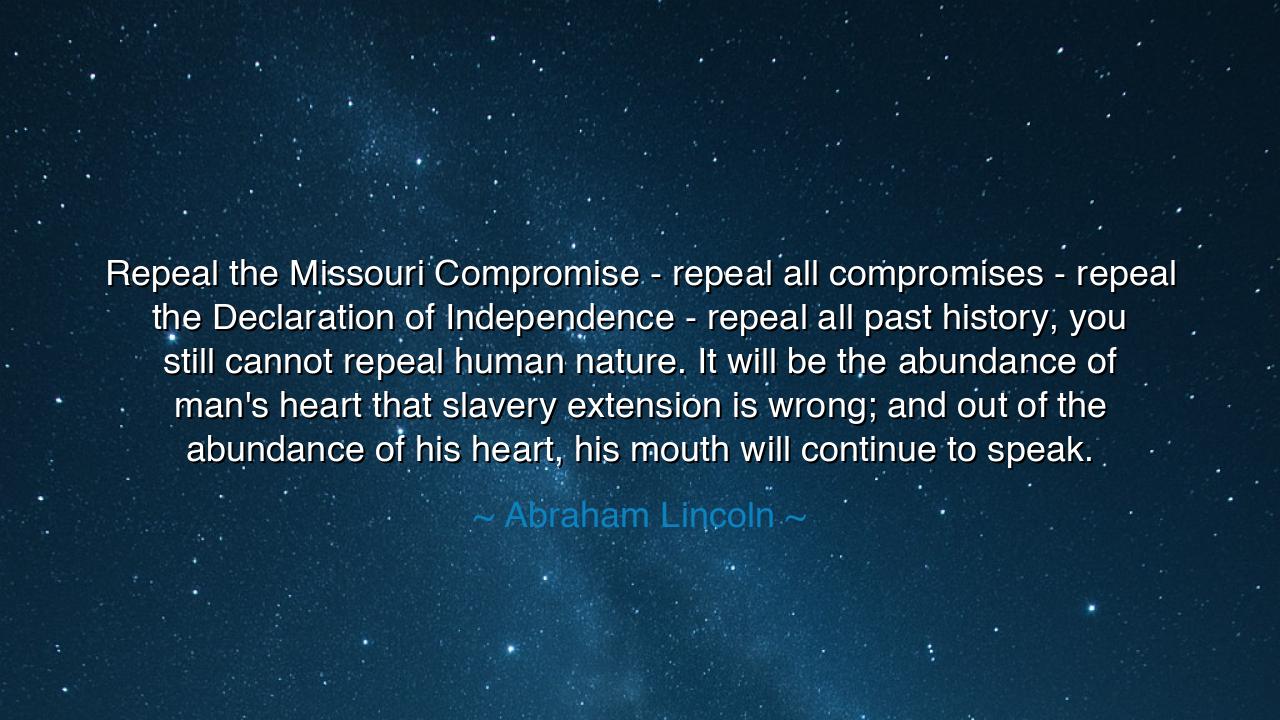
Repeal the Missouri Compromise - repeal all compromises - repeal
Repeal the Missouri Compromise - repeal all compromises - repeal the Declaration of Independence - repeal all past history, you still cannot repeal human nature. It will be the abundance of man's heart that slavery extension is wrong; and out of the abundance of his heart, his mouth will continue to speak.






“Repeal the Missouri Compromise — repeal all compromises — repeal the Declaration of Independence — repeal all past history, you still cannot repeal human nature. It will be the abundance of man’s heart that slavery extension is wrong; and out of the abundance of his heart, his mouth will continue to speak.” – Abraham Lincoln
In these thunderous and immortal words, Abraham Lincoln, the prophet of liberty and the savior of the Union, speaks not merely of law and policy, but of the unchanging essence of human nature and the moral order that binds it. He uttered this truth in 1854, when the Kansas-Nebraska Act sought to repeal the Missouri Compromise — a law that had, for a time, restricted the spread of slavery in the American territories. In that moment, the nation teetered between conscience and corruption, between the higher law of freedom and the lower greed of bondage. Lincoln, with the clarity of moral vision that would one day define his legacy, declared that no act of Congress, no twisting of statutes, no political cunning could erase what the human heart already knew: that slavery was wrong.
The Missouri Compromise, forged in 1820, had been a fragile peace between North and South — a line drawn not merely on maps, but in the moral soul of the nation. Yet when that line was threatened with erasure, Lincoln rose to remind his countrymen that no ink nor parchment could rewrite the truth written into the heart of man. His cry was not a legal argument, but a spiritual one. He saw that history itself, even if rewritten, could not undo the instinct toward justice. The laws of men may shift like sand, but the law of the soul — the yearning for freedom, compassion, and righteousness — endures through every age.
When Lincoln says, “repeal all past history,” he speaks as one who knows the futility of trying to destroy the eternal. Empires have tried to silence the conscience of mankind. Pharaohs built their monuments on the backs of slaves. Caesars crucified dissenters. Tyrants in every century have decreed that might makes right. And yet, as Lincoln declares, human nature cannot be repealed. Within every generation, even amidst fear and oppression, there arises a voice that says, “This is wrong.” The tyrant can ban the book, burn the scroll, rewrite the constitution — but he cannot rewrite the beating of the human heart.
Think of the story of William Wilberforce, the Englishman who fought for decades to end the slave trade in the British Empire. For years he faced scorn, ridicule, and political defeat. But his conviction was born not of expedience, but of moral truth. The governments of men resisted him; the interests of greed conspired against him. Yet his heart spoke louder. And when, at last, Parliament voted to abolish the slave trade, it was not the triumph of one man, but of human nature redeemed — of the eternal law of compassion rising above the temporary laws of profit. What Wilberforce lived, Lincoln spoke: that the abundance of the human heart will always testify to the wrongness of oppression.
In Lincoln’s time, the nation’s heart was divided — some hardened by the habit of power, others softened by empathy. But Lincoln believed that the better angels of our nature, though suppressed, would not stay silent forever. He foresaw that the moral truth of human equality, once kindled, could not be extinguished by any decree. “Out of the abundance of his heart,” he said, “his mouth will continue to speak.” These words are both a prophecy and a commandment — a reminder that truth, though buried under politics or prejudice, will rise again through the voice of conscience. The heart of man may be wounded, but it is never mute.
And so Lincoln speaks not only to his generation but to all who live in times of moral testing. There will always be those who attempt to repeal the moral order, to call injustice progress, to disguise cruelty as law. They will try to silence truth by rewriting it. Yet Lincoln’s voice, echoing through the corridors of time, reminds us that the soul of humanity cannot be legislated away. The spirit that yearns for freedom, fairness, and dignity is older than governments and stronger than any decree. It is the same spirit that broke the chains of slaves, overthrew tyrants, and gave rise to nations born of ideals rather than bloodlines.
So, my child of conscience and courage, remember this: you cannot repeal the human heart. Do not wait for the laws of men to define what is right. Listen instead to the quiet thunder within you — the voice that knows mercy is nobler than cruelty, and that justice, though delayed, is never defeated. Speak, as Lincoln did, from the abundance of that heart. For when the heart speaks truth, it becomes stronger than history, stronger than tyranny, stronger even than death.
And thus, as Lincoln taught in his time and for all time, no compromise, no decree, no power on earth can silence the truth written in the nature of man. Laws will fall, empires will crumble, but the heart — ever beating toward justice — will continue to speak.






AAdministratorAdministrator
Welcome, honored guests. Please leave a comment, we will respond soon